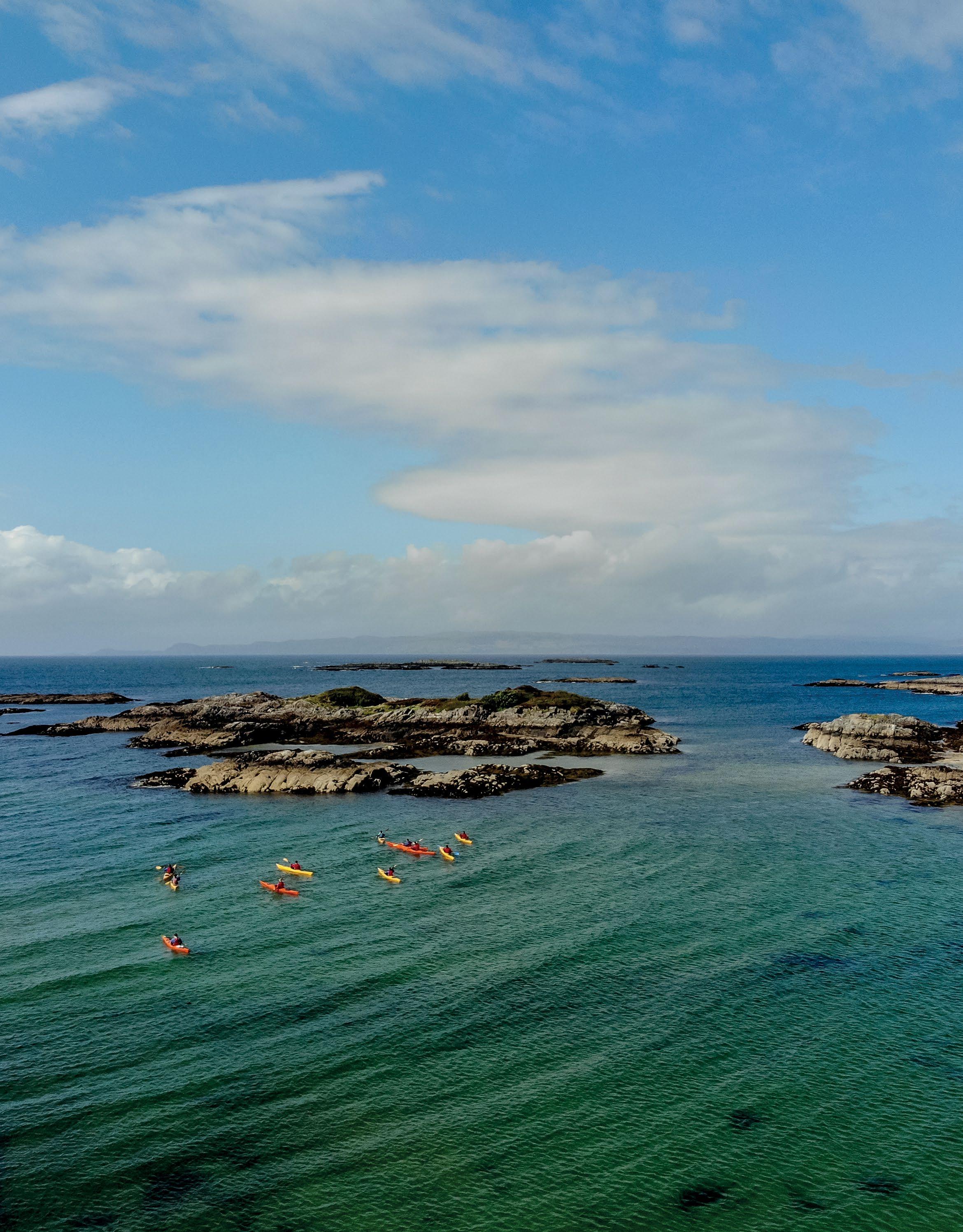Experts' tips and stories of adventures on expedition

CELEBRATING 75 YEARS OF THE CCF

TAKE THE TEST: COLD-WEATHER FIRST AID
DECODING CYBERFIRST
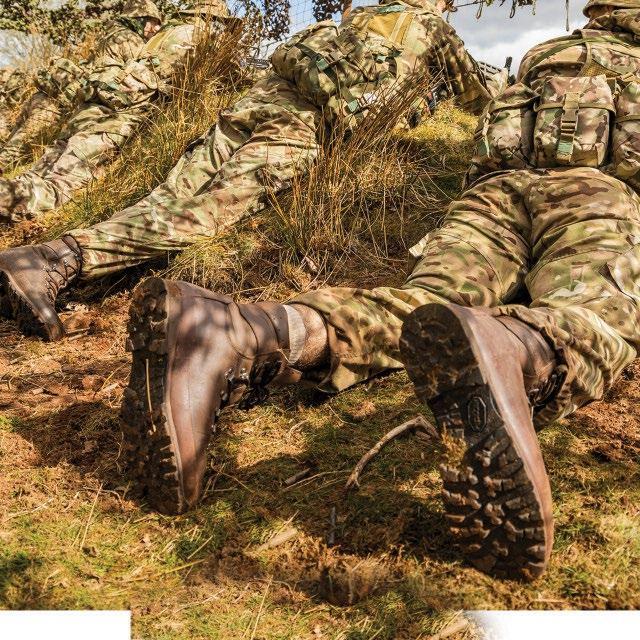




















Experts' tips and stories of adventures on expedition

CELEBRATING 75 YEARS OF THE CCF

TAKE THE TEST: COLD-WEATHER FIRST AID
DECODING CYBERFIRST





















The Combined Cadet Force (CCF) marks its 75th anniversary on 1 April and we’ve been delving into the archives to explore the fascinating history of this fantastic youth movement, which has transformed the lives of so many young people through the decades. Do let us know if your contingent will be holding a special event to mark the year-long celebrations. Turn to page 14 to find out how. April is also the start of exped season and we’ve quizzed a few experienced expeditioners about their top tips, kit recommendations and most memorable moments.

We’ve been catching up with Army Cadets National Ambassador Jordan Wylie MBE, an adventurer who

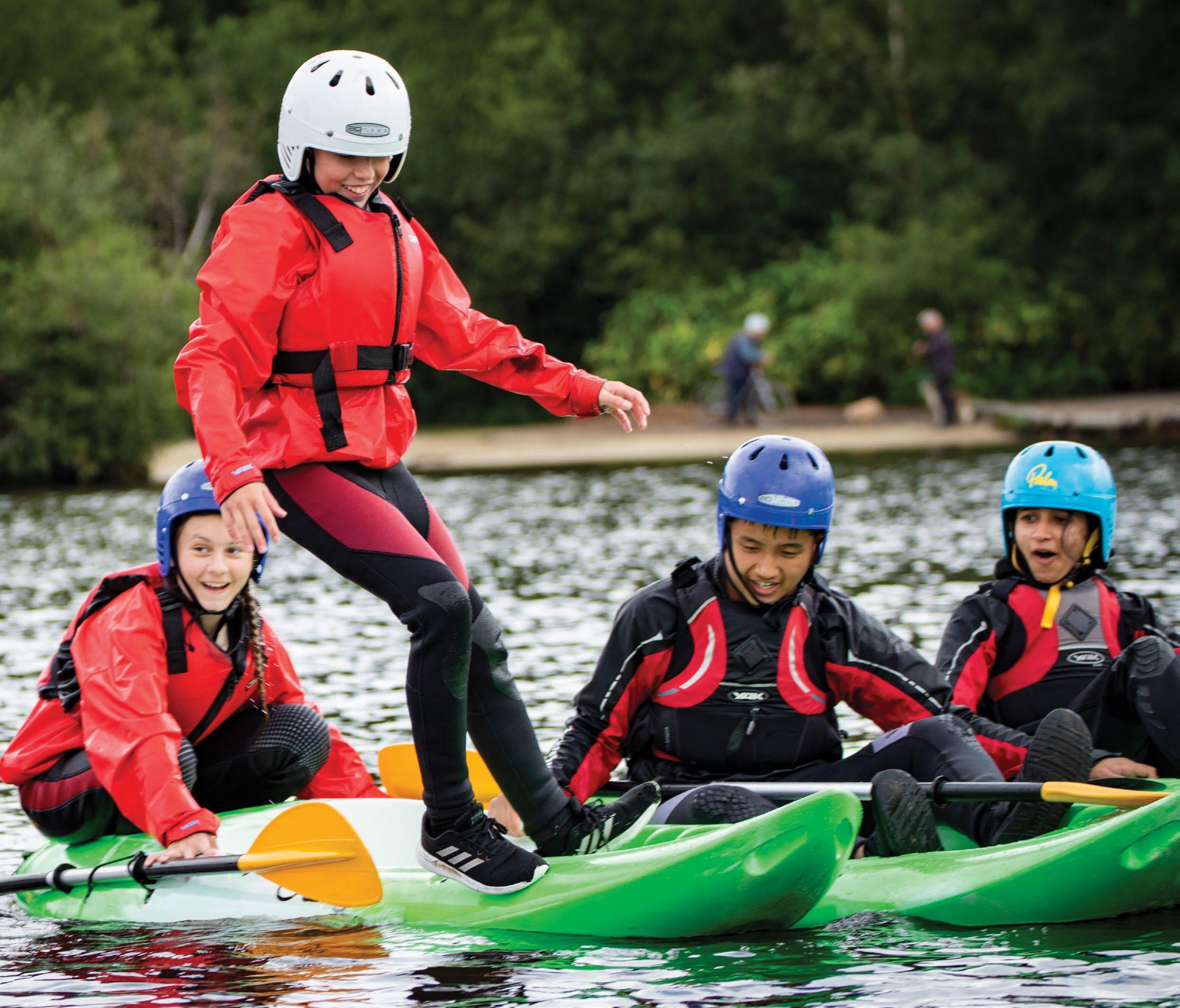
is on a mission to run marathons in ten of the coldest places on the planet. He puts your first-aid knowledge to the test on page 18.
Plus, don’t miss our interview with Captain Robb Bloomfield ACF, cyber security specialist and CyberFirst Project Officer, who reveals more about the brilliant cyber courses that are empowering cadets to take control of their own online security. The longer days of spring bring with them opportunities for adventure, fun and learning so I urge you to make the most of every minute.
Charley Doyle SO1 Media & Communications
'The CCF marks its 75th anniversary on 1 April'

Army Cadets National Ambassador Jordan Wylie MBE



Cyber security specialist Captain Robb Bloomfield ACF decrypts the CyberFirst programme.

Discover why keeping hydrated is one of the most important ways to maintain a healthy body.

Cadets and staff from Bolton Detachment (Royal Artillery) Anzio Company were proud to form part of a welcome party for HM King Charles III and The Queen Consort when they visited Bolton to mark the 150th anniversary of Bolton Town Hall. The cadets were hugely excited, especially LCpl Nathan Jackson and LCpl James Flint who had the privilege of shaking His Majesty’s hand. The King thanked the young people who lined the steps of the Town Hall.


The nation will celebrate the Coronation of the King over the weekend of 6-8 May, with plenty of opportunities for cadets and CFAVs to mark the occasion within their local communities.
Saturday 6 May There will be 150 Cadets, representing all three services, in attendance at the Coronation of King Charles III. The ceremony will take place at Westminster Abbey and be conducted by the Archbishop of Canterbury.
Sunday 7 May A special Coronation Concert at Windsor Castle will be broadcast by the BBC and feature performances from global stars of stage and screen. On a local level there will be opportunities for cadets to take part in the Coronation Big Lunch and share food with their communities in a nationwide act of celebration and friendship.
Monday 8 May In tribute to His Majesty The King’s public service, The Big Help Out will see communities join in various volunteering projects. Army Cadets is encouraging cadets to volunteer in their local communities and assist in regional projects. You can find out more details about the event on our website and socials.
Musicians of Gwent and Powys ACF were joined by others from across the UK in the annual Rorke’s Drift Concert at Theatr Brycheiniog in Brecon in February. It was the 23rd time the event had taken place and was a triumphant return after being put on hold for a few years due to adverse weather and the pandemic.



More than 3,000 Duke of Edinburgh's Awards are underway and over 1,000 completed since April 2022. The top performing counties (at the time of writing) were Northumbria ACF for enrolments, and Somerset ACF for completions. Can your county challenge their top spots?
Congratulations to the following, who have recently achieved their Gold DofE Awards:
Jack Nicholls Lancashire ACF
Tyrone Longton Lancashire ACF
Elliot Davies Somerset ACF
Ryan Gourlay Black Watch Bn ACF
Charlotte Huntley Cheshire ACF
Sheetal Chopra Cambridgeshire ACF
Matthew Peters Devon ACF
New CFAVs (and those who would like a refresher) can access DofE e-induction by scanning the QR code or clicking here

It takes 30-45 minutes and completion should be recorded on Westminster.
Many of you will have followed the progress of Army Cadets National Ambassador Sally Orange as she completed her immense 7-7-7 Marathon Challenge. The adventure saw her complete seven marathons over seven days on seven different continents, which raised money for seven charities. More people have stood on top of Everest than finished this challenge and Sally becomes the fifth British woman and the only British female military veteran to accomplish this World Marathon Challenge.
Well done to all cadets who undertook a number-seven-related physical challenge for DofE at the same time.

The Army Cadet Charitable Trust


UK (ACCT UK) is challenging cadets to get involved in a huge fundraising effort to raise money to benefit fellow cadets. The Cadet Challenge 2023 is calling all cadets and CFAVs to raise at least £10 before the end of 2023.
The majority of cadets will have benefited from support from ACCT UK, even if they don't realise it, and the charity wants to continue to help cadets achieve their full potential in the ACF.
Those who come up with an especially innovative moneyraising idea will also be in with a chance of winning ACCT UK's Fundraising Award, which will be presented at the BAE Recognising Excellence Awards in London in 2024.
ACCT UK is the official charity for the ACF and for over 90 years has ensured all cadets have access to affordable, exciting challenges and adventures such as trips abroad, specialised camps and more. The charity also provides help with insurance, grants and training, and has introduced a mental health support helpline for CFAVs and their families.
Click here or scan the QR code to set up your fundraising page.
Click here or scan the QR code to read ACCT UK's A-Z of Fundraising.


PI Nadine Howard (Bedfordshire and Hertfordshire ACF) is the first person in ten months to achieve the prestigious Meritorious Action Certificate (the higher of the two ACCT UK awards). Nadine witnessed a car crash and immediately went to help. A 50-year-old female victim was lapsing in and out of consciousness and complained of severe back and neck pain. Leaving her own two young children with a bystander, PI Howard climbed into the back of the woman’s car to support her head and safeguard her neck and back. After 30 minutes the police arrived, and asked PI Howard to maintain support
while they took over managing Nadine's children until an ambulance arrived 45 minutes later. PI Howard continued to assist while paramedics looked after the casualty.
Also, after nomination by ACCT UK, Royal Humane Society (RHS) Awards Resuscitation Certificates were granted to Lieutenant Christopher Cooper, Squadron Leader Jonathan Evans, Major Philip Anthony Hurley, Captain Franco Rizzo, Emma Lambert and SSI Austin Snelson. Three lives were saved by their successful resuscitation attempts.


Army Cadets was delighted to be invited by India’s National Cadet Corps (NCC), for the second year running, to take part in their India Youth Exchange Programme (YEP) in New Delhi.
Ten UK Army Cadets from the counties of Northumbria, Cambridgeshire, Leicestershire, Northamptonshire and Rutland, Oxfordshire, London SE, Gwent and Powys, and Suffolk went on the amazing 15-day trip, setting off from Heathrow on 11 January.
Cdt Sgt Rebecca Scott, Cdt CSM
Uashar Badakhshan,
Cdt Sgt Kate Bilclough, Cdt RSM Thomas Dyer, Cdt SSgt Dominic Smith, Cdt CSM Oliver Wade, Cdt CSM Sasha Louwman, Cdt SSgt Rosie
Walters, Cdt Sgt Abbie Addiscot Allen and Cdt Sgt Kevin Fresneda Jara were accompanied by adult volunteers Lt Col Mike White (Northumbria ACF) and Capt Fiona Short (Greater Manchester ACF).
The packed itinerary included cultural, tourist and military visits, formal dinners, VIP receptions and parades. There was also an opportunity to meet India’s Prime Minister, Shri Narendra Modi, and Defence Secretary Shri Giridhar Aramane I.A.S., plus an afternoon tea with President Smt Droupadi Murmu. NCC's motto is 'unity and discipline' and it has an incredible 1.2 million cadets spread across India.
The group kept a diary in which they recorded all of the brilliant activities they were invited to take part in. Here are a few excerpts:
'We listened to a presentation about Puneet Sagar Abhiyan – a fantastic climate change initiative which the NCC cadets have driven.'
'Indian food was always going to be a feature of our visit and we were introduced to thali – a platter made up of several different dishes to create a perfectly balanced meal. It was a little spicy for most but thoroughly enjoyable.'
In return, the UK will host approximately 20 Indian cadets and adults in August 2023.










• Cultural presentations at HQ NCC from regions of India such as Gujarat, Punjab and Kerala.


• A visit to the National War Memorial, National Museum and India Gate.
• Dining at local restaurants.
• Visit to the president and prime minister’s homes.
• Formal dinner hosted by the Defence Minister of India Hon Raksha Mantri.
• Visits to markets and malls.
• Introduction to yoga at the Morarji Desai Institute of Yoga.
• Attendance at the Independence Day celebrations at India Gate.
• Inclusion in the PM Rally.
• Visit to the Taj Mahal (one of the Seven Wonders of the World) and Agra Fort (UNESCO World Heritage Site).
• Each participating nation delivered a five-minute presentation on their country and a fiveminute cultural dance. The UK contingent performed a traditional Scottish folk dance called Strip the Willow.
Friends were made from across the globe, as there were 19 international delegations involved in the programme: Seychelles, Russia, USA, UK, New Zealand, Kazakhstan, Tajikistan, Kyrgyzstan, Uzbekistan, Nepal, Brazil, Argentina, Vietnam, Mongolia, Mozambique, Sudan, Mauritius, Fiji and Maldives.
Language proved no barrier to communication. Cadets learnt the phrase ‘Vasudhaiva kutumbakam’ (the world is one family) and discovered new ways to understand one another. For example, the UK cadets shared most of their coach journeys with cadets from the USA and Mongolia and it was only a matter of time before music and song overcame any international hurdles.
Want to experience this trip of a lifetime? For details of how to apply for the next India exchange, keep an eye on the Army Cadets website, along with your company and county websites, your county detachment and Part One Orders.
Top: After the cultural presentations
Fancy a challenge this year? Exercise Corte Challenger is a 14-day self-sufficient mountain trekking exercise on the Mediterranean island of Corsica, which will take place from 8-22 July.

The aim is to complete the northern section of the Grande Randonnée 20 (GR20). It's considered the most difficult of all the European GR routes and reaches heights of over 2,000m along its 90km length.

Cadets from Buckinghamshire ACF's 4th Platoon in Aylesbury learnt some exciting new skills due to a new partnership with Buckinghamshire Fire and Rescue. Cadets took part in a pilot scheme throughout 2022, enrolling on a three-phase training programme and attending evening sessions to gain knowledge and experience of hose running, pumping, trauma care and casualty evacuation.
Five cadets were even invited to assist with activities at Aylesbury Fire Station’s annual open day. Well done for the leadership and initiative shown by L/Cpl Harry Isom, L/Cpl Haris Hussain, L/Cpl Jack McCormack, L/Cpl Hadley Noonan and L/Cpl Alex Graham Particular mention goes to L/Cpl Harry Isom who led a rescue demonstration in front of a big crowd.
The expedition is open to ACF and CCF Army cadets aged 15 and over, along with CFAVs who’ve completed mountain leader training and are working towards assessment. Keep an eye out for a Cadet Briefing Note for further details of how to book a place.
British Army Officer Preet Chandi (who we interviewed for Army Cadet Magazine in February last year) has broken two world records after a 922-mile (1,485km) trek across the Antarctic. It was the longest solo and unsupported polar ski expedition by a woman and set a new overall record. She trekked from the Hercules Inlet to the Reedy Glacier across Antarctica in 70 days and 16 hours. The previous world record of 907 miles (1,459.8km) had been set in 2015 by retired Lieutenant Colonel Henry Worsley. Congratulations Preet!


The A310 Rainshield from UK military clothing supplier Arktis is a lightweight packable waterproof coat. It combines Arktis' waterproof smock technology with the lightweight properties of its classic Stowaway shirt. The result is an extremely lightweight low-profile waterproof shell coat, which provides essential protection from wind and rain.
Based on feedback from military, police and civilian customers, this revised version of the original A310 Rainshield offers new and improved features. The pocket configuration has been revamped and simplified for ease of use and now includes two waist pockets, plus a single chest pocket (complete with waterproof zips to further minimise water ingress).

An internal storm flap provides an extra layer of protection in torrential rain and wind, while the general fit of the coat has been improved via longer sleeves and better hood coverage.

Colour MTP
Weight around 400g (size M)
Arktis A310 Rainshield MTP Waterproof Coat
Nylon DWR Minirip outer with 100% waterproof dropliner
Single chest pocket with waterproof zip
Internal storm flap
Waterproof zips with zip garages
Improved fit with longer sleeves and larger hood
Super-lightweight construction (just 400g based on size M)
Packable design (compression sack included)
Sizes (chest) S (91-96cm), M (101-106cm), L (112-117cm), XL (122-127cm), XXL (132-137cm)
Click

On 1 April, the CCF marks 75 years of equipping young people with new skills, improved teamwork, confidence and leadership.
It's the start of a whole year of celebrations (April 2023 to April 2024), which will commemorate the military-themed youth organisation's 75-year history (see the timeline on Page 16).
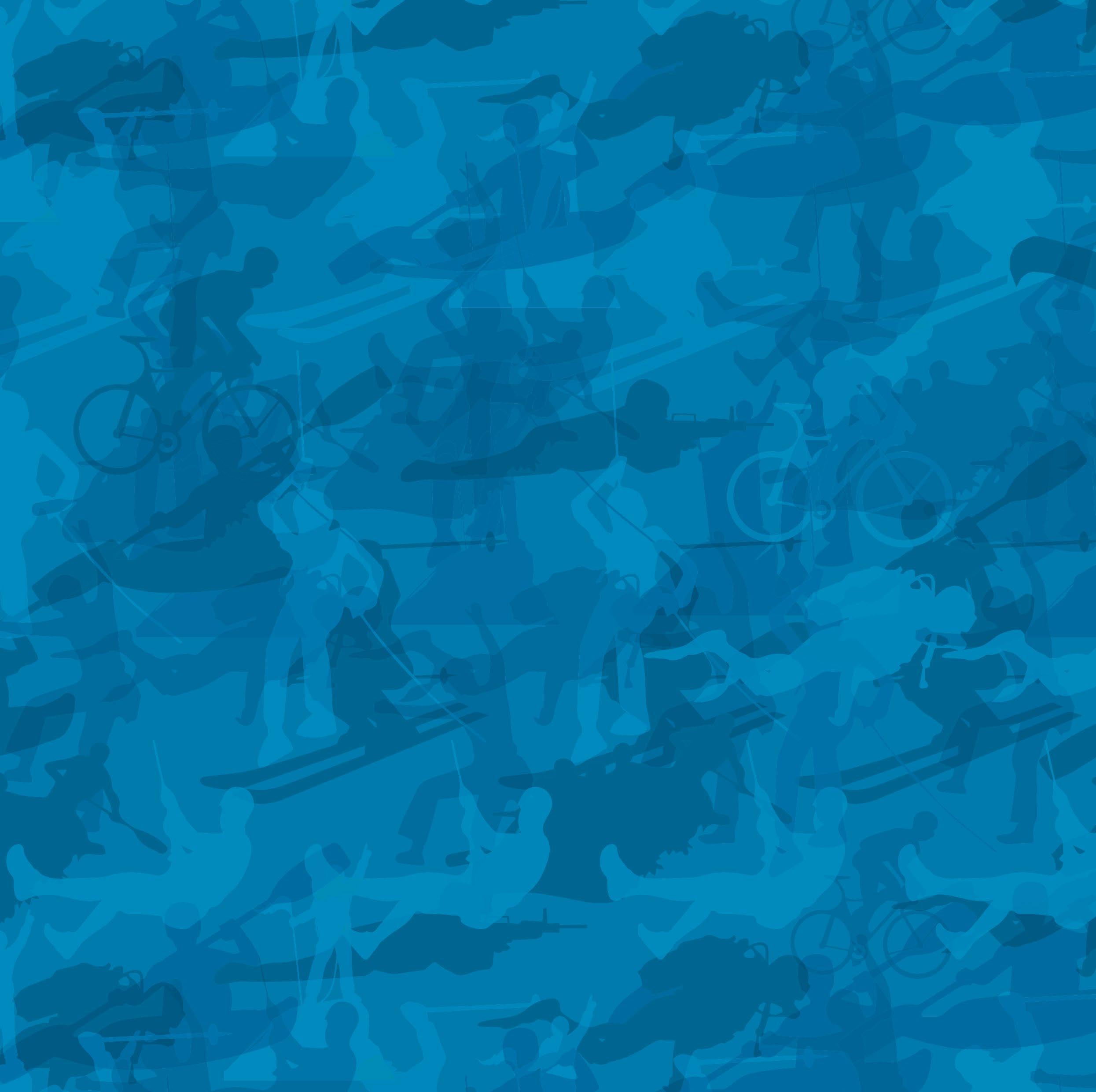
There will be a number of high-profile engagement events that will run throughout the 12 months. Keep your eyes peeled for further details in upcoming editions of Army Cadet Magazine.
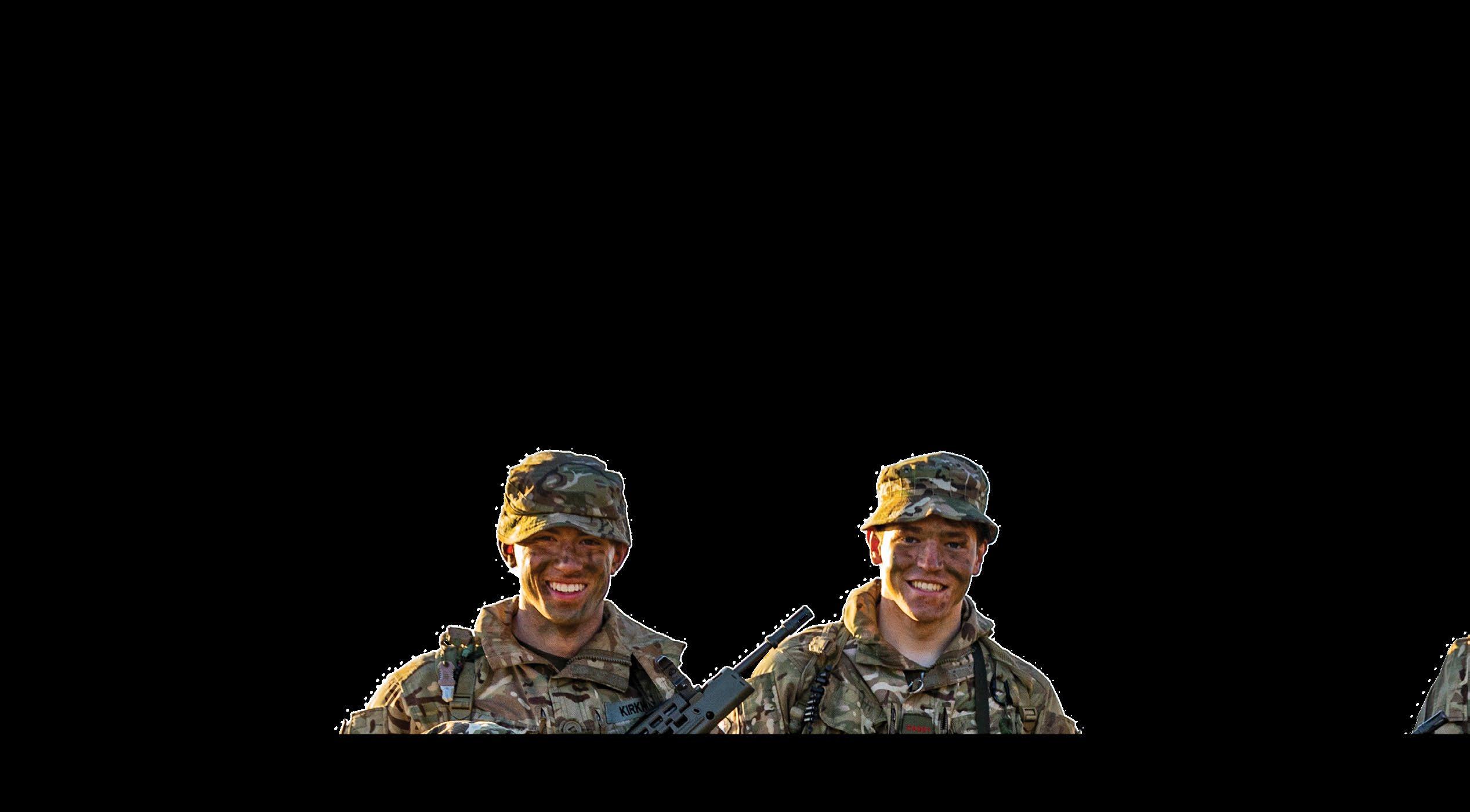
Today there are CCF contingents in more than 500 secondary schools across the UK, which offer young people a host of challenging, exciting, adventurous and educational activities.

The CCF is renowned for helping young people develop personal responsibility, leadership and selfdiscipline, but also offers an outstanding selection of extra-curricular activities.
Opportunities may range from flying a plane, climbing mountains and learning to sail to making an incredible new set of friends. There are also plenty of chances to gain recognised qualifications in disciplines such as first aid, and to take part in national programmes such as DofE.
Each CCF is an educational partnership between the participating school and the Ministry of Defence (MOD) and may include Royal Navy/Royal Marines, Army or Royal Air Force sections.
'MOD-sponsored cadets have been a key part of the enrichment experience in schools since its first iteration prior to 1948, as a junior division of the Officers' Training Corps in selected independent schools,' said Brigadier Anthony Lamb, MOD Head of Youth & Cadets, CCF Contingent Commander and Deputy Head (Co-curriculum) at Eastbourne College.
'Today the modern CCF is a vibrant, 21st-century uniformed youth movement which is helping to transform the lives of young people across the social spectrum.
'The value doesn’t just come from the cadet experience itself. What is already being recognised is that, for some, the cadet experience also acts as a catalyst that helps them unlock their self-belief and improve their engagement and wider learning across other aspects of the curriculum too.
'We will be encouraging schools to celebrate this national milestone in their own way, whether it be by reaching out to former members of their own CCFs, or by aligning some of their great activities with this anniversary year.'
Cambrian Cadet Patrol Photo: Kate KnightThe CCF has a long and fascinating history, which includes royal patronage. In February 2010, Barnaby Spink (pictured above with Her Majesty Queen Elizabeth II) was one of just 26 cadets selected to meet the Monarch for the launch of the cadet movement's 150th anniversary.

The late Queen was the patron of Cadet 150, a programme of 150 events which took place across the cadet movement that year. At the time she was also Captain General of the CCF.

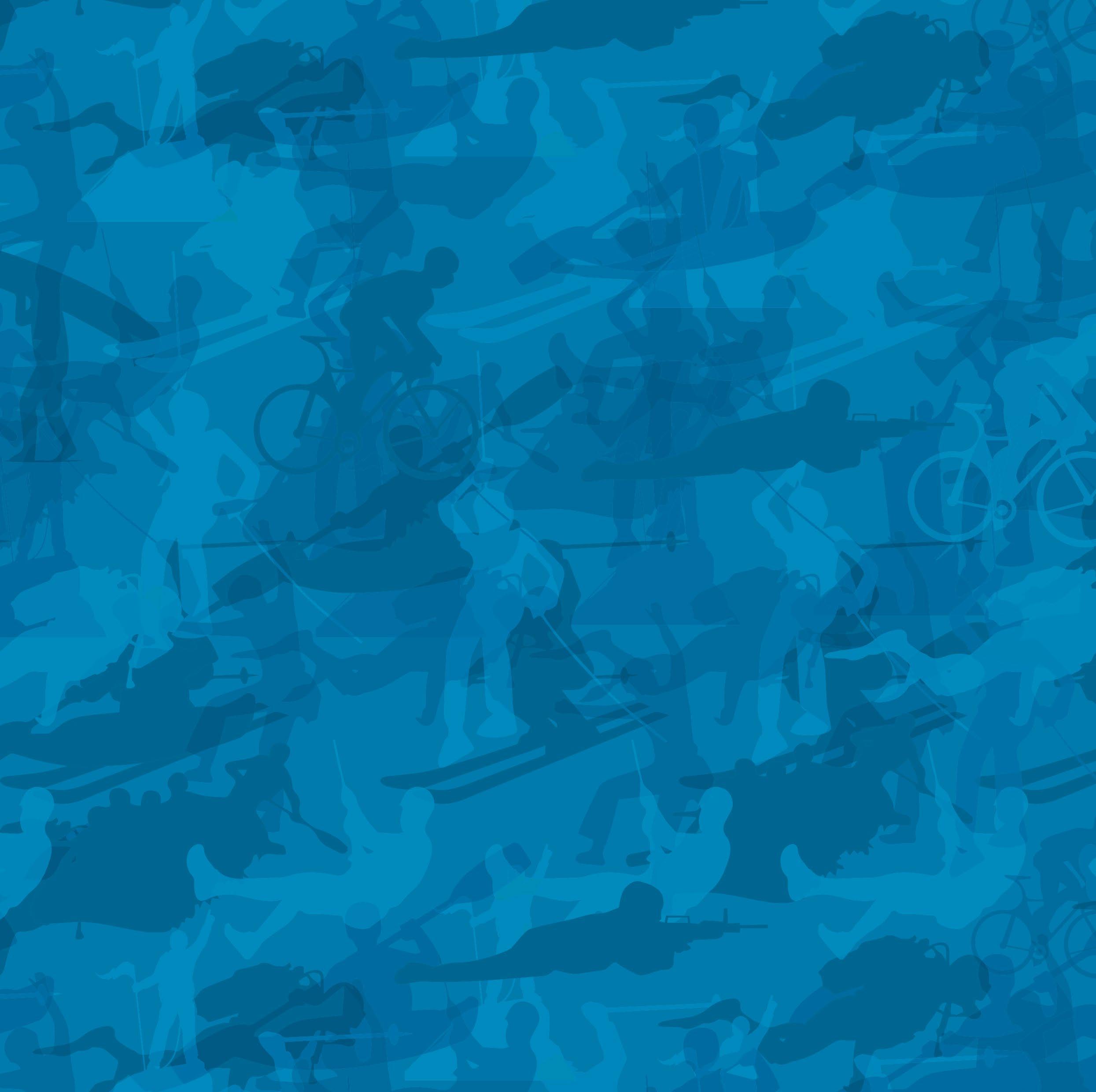
Former head boy Barnaby was nominated for the honour due to his outstanding commitment to the CCF: at the time he was the Lord Lieutenant's Cadet for Cambridgeshire and a Cdt Sgt in Kimbolton School CCF.

'We had only received a loose itinerary for the weekend,' he said. 'We knew we would be seeing key sites, including the Ministry of Defence and Buckingham Palace, but we had no idea who we would meet.


'Beyond our wildest expectations, as we stood in the Bow Room of Buckingham Palace, in came the Queen and Prince Philip and for half an hour we spoke with them about all the cadet movement could offer young people.'
Delving even further back into the archives, the image (left) shows His Majesty King George VI in his capacity as the Captain General of the CCF. He was inspecting part of the Signal Platoon of Portsmouth Grammar School CCF at Bourley Camp, Aldershot, on 9 August 1948.

'In came the Queen and Prince Philip and we spoke with them about all the cadet movement could offer young people'
1859
Forerunners of cadet forces in schools first appeared when a number of schools formed units for the defence of the UK in response to the threat of invasion by France. Although the threat receded, the units remained and, over time, more schools formed units which evolved into the Junior Officers’ Training Corps, administered by the War Office.

1948
It was decided to combine all cadet units in schools into one organisation named the Combined Cadet Force (CCF), with contingents being able to have one or more service sections. There were 247 schools that accepted the invitation to adopt the new scheme and the new CCF was honoured by His Majesty King George VI becoming its Captain General.



1952
The Combined Cadet Force Association was established to represent all the schools with CCF units.
1953

Sedbergh School guard inspection in 1987



Eastbourne College in 1952

Is your CCF contingent celebrating CCF 75 with a special event? If so, don't forget to email us a post-event report with large high-resolution pictures for possible inclusion in the magazine. Send to RC-Cdts-CMC-0mailbox@mod.gov.uk

The cadet forces celebrated their 150th anniversary throughout 2010. On 7 July there was a Royal Review, when cadets and adult volunteers from all cadet forces marched down The Mall. The then Prince of Wales took the salute outside Clarence House, which was followed by a Royal Garden Party in Buckingham Palace.
The Government launched the Cadet Expansion Programme (CEP) to strengthen the cadet forces. The aim of the CEP was to form new cadet units in English statefunded secondary schools, focusing on state schools in areas of high deprivation. It was a joint Ministry of Defence and Department for Education programme. £50 million from LIBOR fines was committed to the programme.
Since the start of CEP in 2012, 362 schools have been approved to establish a cadet unit. The Government’s ambition now is to increase the number of cadets in schools from 43,000 to 60,000 by April 2024. This has completely changed the shape of the CCF from being an organisation where independent school contingents outnumbered state school contingents, to now being one where state school contingents are in the majority.
Think you would know how to respond to an emergency in bitterly cold conditions? Let Army Cadets National Ambassador Jordan Wylie MBE put your first-aid knowledge to the test.
Army Cadets National Ambassador Jordan is a bestselling author, extreme adventurer, former soldier and one of the stars of Channel 4’s BAFTA-nominated shows Hunted and Celebrity Hunted.
In 2018, he completed a challenge called Running Dangerously which raised more than £35,000 for charity and saw him return to three conflict zones (Iraq, Somalia and Afghanistan) where he had either

served as a soldier or worked as a private military contractor. He ran marathons in each country.
Building on this incredible feat, in 2020 he started a new challenge called Running Dangerously Polar Edition in which he set out to run marathons in each of the ten coldest countries on the planet in aid of the charity Frontline Children. Read all about his coldweather adventures so far then turn the page to take the first-aid test.
It should have finished three years ago but, due to the global pandemic and the ongoing conflict between Russia and Ukraine, like most adventures things haven't gone exactly to plan!
I've run in Siberia, Antarctica, Greenland, Lapland, Iceland, Yukon in Canada and Alaska in the US (although that one got terminated after 10 miles due to an avalanche warning). This year I'll head to Svalbard in Norway, the North Pole and Outer Mongolia.
It’s always about the adventure! I don’t worry about times or records when running; I focus on enjoying it and being present. I often stop during the event to admire the landscape, the animals and the wilderness because I just want to enjoy the challenge, regardless of how difficult the conditions may be.
The invigorating feeling of cold air on the skin, the sense of accomplishment from pushing through the elements, being immersed in the great outdoors and the opportunity to experience the most epic snowy and icy landscapes.
The discomfort of being cold, the potential for frostbite or hypothermia, and the increased risk of injury on slippery surfaces.
It’s important to properly prepare for cold-weather running by dressing in layers and learning to regulate your body temperature, wearing appropriate gear, and keeping an eye on the weather forecast to ensure your safety – which should always be your main priority.
It’s about having a sense of gratitude wherever I go. I don’t come from a wealthy family, nor do I earn lots of money, so I see every adventure as a great privilege. I often drift into thought when I’m running. When things get really tough, I think about friends, family and loved ones who are no longer with us and what they would do to take a few more breaths or to live a little longer.
It can improve mental and physical health, increase resilience and enhance social relationships. Expressing gratitude can increase feelings of happiness, reduce stress, anxiety and depression and increase overall life satisfaction.
Gratitude helps me foster a more positive outlook on life, helping me focus on what I have, rather than what I lack. I know I'm super lucky to travel the world on a monthly basis, so I never take it for granted.
Start slowly and build up gradually, invest in a good pair of running trainers and set realistic goals.
Pay attention to how your body feels when you run so you are mindful of any pain or discomfort. That's really important to help you avoid injury. Mix it up and keep things interesting by running in different locations or incorporating other types of exercise into your routine. Remember, running should be enjoyable and safe so don't put too much pressure on yourself – have fun!
Setting realistic goals will give you something to work towards and motivate you to keep going. Find a fellow cadet, friend or family member who also wants to take up running. This will make the experience more enjoyable and you'll have someone who will hold you accountable – and you can do the same for them.
1You've been hiking across snow in freezing conditions when one of your group feels unwell. Which of the following signs might indicate they are suffering from hypothermia?

A. They're shivering and their skin looks pale and dry.
B. They are warm and flushed.
C. They have a full or bounding pulse.
2If they are showing signs of hypothermia, which of these actions should you take?
A. Encourage them to lie on the ground and then raise (and support) their legs.
B. Take them indoors if possible and cover any wet clothing with a warm blanket.
C. Take them indoors if possible, protect them from the cold ground and replace any wet clothing with dry clothing.
3If a running companion complains of the following symptoms, what would you suspect? Dry mouth, headache, feeling lightheaded and urine that is darker than usual.
A. Asthma.
B. Hypothermia.
C. Dehydration.
4 You are taking part in a training exercise and one of your group slips on ice and sustains an open fracture to their leg. As a general rule, which of these should you not do?
A. Give the casualty water and high-energy food.
B. Cover the wound with a double layer of sterile dressings or clean padding and secure it with a bandage.
C. Immobilise the injured body part and arrange to transport the casualty to hospital.
5 Your group have been sheltering from the wind in freezing conditions. One of your party complains of pins and needles in their feet and thinks they might have frostbite. What is it?
A. A condition that occurs after a tick has bitten a person and become frozen beneath their skin.
B. When the tissues of the extremities – usually the fingers and toes – freeze due to low temperatures.

C. Stiffening of the ankle joint due to extreme cold weather.

1. A With hypothermia (when the body temperature falls below 35C), the blood supply to the superficial blood vessels in the skin shuts down to maintain the function of vital organs (such as the heart and brain) so shivering and pale, dry skin are key signs to look out for. Your fellow hiker may also have a slow pulse and their breathing could be slow and shallow.
2. C You should take the person with hypothermia to a sheltered place as quickly as possible and protect them from the cold ground. Remove and replace any wet clothing if possible, then dial 999 or 112 for help. Warm them by giving them warm drinks and high-energy foods such as chocolate while continuing to monitor their vital signs.
3. C Dehydration occurs when the amount of fluids lost from the body is not replaced adequately. This may lead to a dry mouth and dry eyes and cause headaches, dizziness, confusion, cramp and urine that's dark in colour. See our feature about hydration on Page 30.
4. A With any fracture you should not allow the casualty any food or drink because an anaesthetic might be needed.
Other things to avoid are moving the casualty before the injured part is secured and supported (unless they are in immediate danger) and, in the case of an open fracture, pressing directly on a protruding bone end.
5. B Frostbite occurs when the body's extremities freeze in low temperatures. It usually occurs in freezing or cold and windy conditions. People who cannot move around to increase their circulation are particularly susceptible.
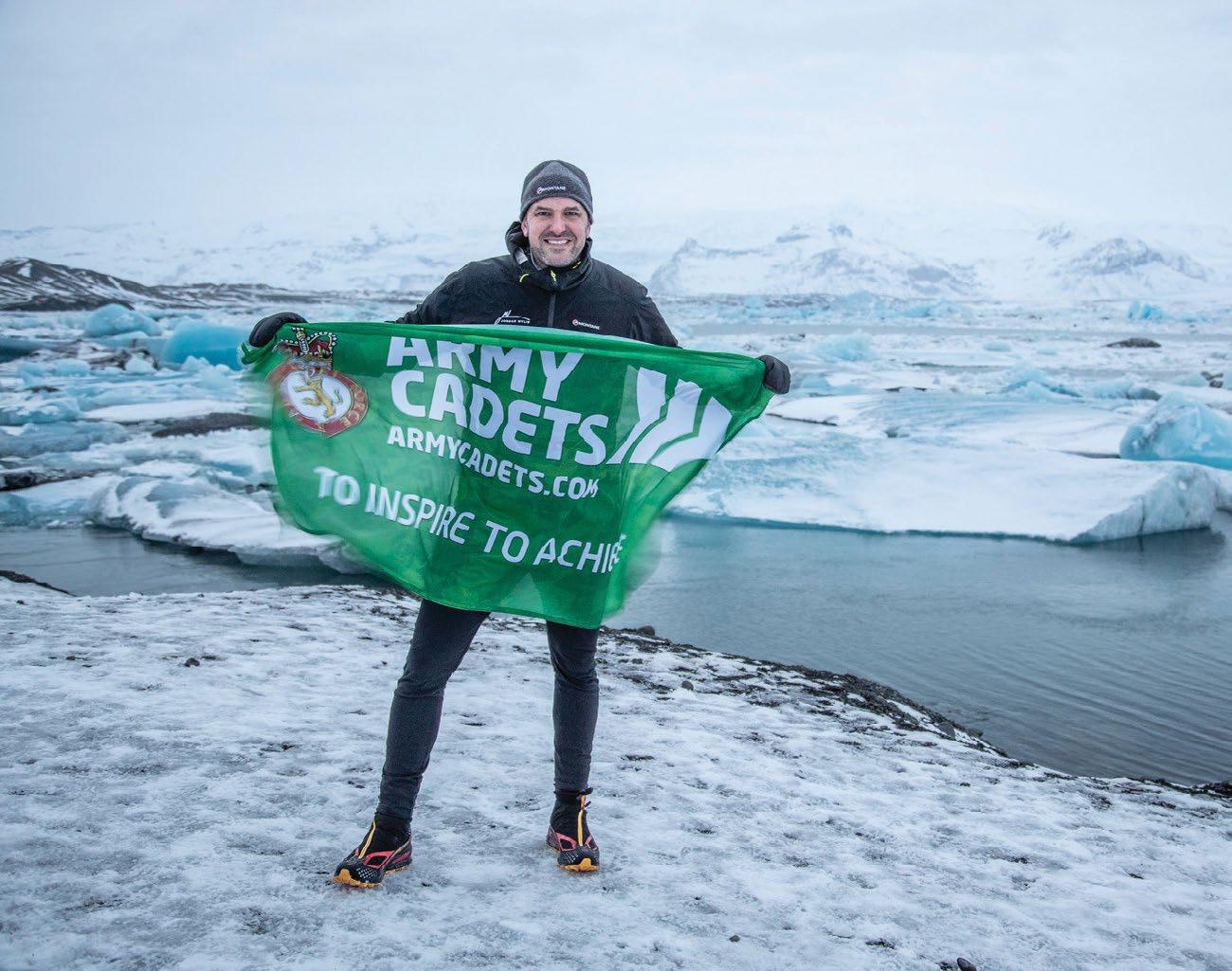

Another sign of frostbite might be a change in the colour of their skin (first white and then mottled and blue). It can also be accompanied by hypothermia.


My best expedition was a trip in 2019 to Everest Base Camp in memory of my mother who had passed away. A special moment during that trip was sitting with my son (a cadet at the time) at the base camp for Ama Dablam. Our Sherpa cook had prepared us a lunch of fresh bread, garlic soup and lemon tea, which we shared while overlooking snowy mountains.

Another memorable moment was from an Army Cadets expedition, The Open Gold, which took place at Otterburn Camp last October. The group I was overseeing had to divert their route due to fallen trees in a forest so we missed each other for a checkpoint. I returned to my vehicle to find a note saying: ‘Don’t worry we R still alive’, which made me chuckle and showed they could cope with anything.
A good game I've played with cadets to fill time at camp and help the team gel is 'truth and lie'. One cadet picks someone they don’t know in the team, then takes them somewhere the rest of the group can't hear their conversation and asks them for three statements about themselves: two that are true and one that's a lie. They then rejoin the team and introduce their new friend, giving the three bits of information, and the group has to decide which is the lie.
'Don't worry, we R still alive ...'

The first was DofE when I was 13, which gave me my first taste of adventure and freedom. The second was with the Army: I was in the Army ski team and went on the tour leaders’ course, where you go off-piste into back country. It was thrilling because we were going to places that people hadn’t been for weeks and cutting our own tracks. At one point we got avalanched in and had to build a snow hole to sleep in before we could get ourselves out (pictured). That was character-building stuff!
If I’m doing a solo expedition, I always take my Garmin watch as it has all my maps and can also send a satellite signal if I fall or get stuck somewhere. I also take my phone, a spare pair of socks, a pack of cards and my favourite treat to boost energy levels and mood: a vegan "pork" pie.

Enjoy it! It’ll be tough but it’ll also be amazing. You’ll get to meet new people and build connections. Pack your kit well in advance and do some short trial walks beforehand with it, so you can make sure it's comfortable.
At the end of April I’m doing a Scotland 300, which starts with a 100-mile walk of the West Highland Way with all my full kit – on my own and unsupported. Then I’m jumping in a kayak


'A vegan "pork" pie to boost my energy levels and mood'Gilly Moncur, SO3
Climbing Kilimanjaro, which we did over eight days – five days' gradual climb to acclimatise, one day’s final steep ascent and two days of rapid descent to avoid altitude sickness. The last kilometre along the ridge was literally one step in front of the other but being at the top (pictured – Gilly on left) was amazing. Our heads were swimming with the altitude, exertion and euphoria.

Try to get your map-reading skills as good as they can be before you go. Apps like Ordnance Survey are great but, if your phone battery runs out or there’s no signal, you still need to know where you're going. Have the right maps to cover the whole of your exped (I like 1:25,000 best for walking). Have a compass and know the basics of using it and study the map beforehand to get a feel for the route and terrain.
A different pair of footwear for evenings in the camp (usually trainers or Crocs) to give my feet a breather. One of my personal luxuries is my map case, where I keep my maps and compass. It has a pocket for a pencil, emergency whistle and magnifying glass.
A good one that helps everyone get to know each other is to ask each person to show the latest photo on their phone and reveal to the group why it’s important to them.
A trail mix created from a packet of mixed fruit with cranberries and apricot to which I add some mixed nuts and seeds. I try to avoid snacks with artificial sugars if I can, and this one provides lots of energy.


I did my Gold DofE when I was 17. I was an Air Cadet and we did it in the Cairngorms over four days. It was a circular route and the sense of isolation was amazing. We saw lots of deer and birds of prey, and had a great team and – most importantly – good food at the end of each day (especially puddings), which kept us going!
On one of the days, we met another group with an injured person. We helped them to get a helicopter to airlift them off the mountain. It was terrible for them but exciting for us to be involved.
Aim to get into your sleeping bag dry and to keep any wet gear out of the way; you’ll be so grateful for a warm bed. Also know how to cook a meal you’re going to enjoy.
The most important thing of all, however, is to know what to do when something does go wrong – whether that’s a blister or a broken shoelace or something more serious like an injury or getting lost. You need to understand what you can deal with yourself and when to ask for help.
One was a solo trip following the Chemin de la Liberté (Freedom Trail), a five-day mountainous trek across the central Pyrenees from France into northern Spain. It was the route used by prisoners of war escaping to neutral Spain from German-occupied Europe during the Second World War. I saw very few people on the route, so maintaining my own safety was very important.
The second was an expedition during a half-term in 2018 when I took my two daughters (then aged 12 and 14) on a self-guided trek traversing Hadrian’s Wall (pictured) from Newcastle to Carlisle. It was fantastic to spend quality time with them and to complete an expedition I'd been trying to do but which kept being postponed due to operational commitments. The girls were apprehensive at the start, but they talk about it as one of the best things they've ever done.


Pack light! Take a look at everything in your rucksack and ask yourself if you really need it. That extra phone battery shouldn’t be necessary if the phone is just for emergencies. An electric toothbrush is a bit of a luxury that won’t be needed – just use a normal one. At the end of an expedition, I always ask cadets what they learnt and they nearly all wish they'd packed lighter.
Lightweight flip-flops. After a long day trekking you need to give your feet some air.

Getting a good night’s sleep is key. I take a sleeping-bag liner and an inflatable pillow. If you can sleep in warmth and comfort you can deal with the challenges of the following day. Also take treats you like which'll perk you up.

'Getting a good night's sleep is key'
CyberFirst was set up by the National Cyber Security Centre to introduce young people to cyber security. The Army Cadets’ CyberFirst programme differs from the public programme slightly as we only run three courses: Adventurers (a one-day course), Defenders, and Advanced (both week-long residential courses). There are no age restrictions, but Defenders is a four-star-qualifying course so we’d expect cadets to be two-star complete to be eligible.

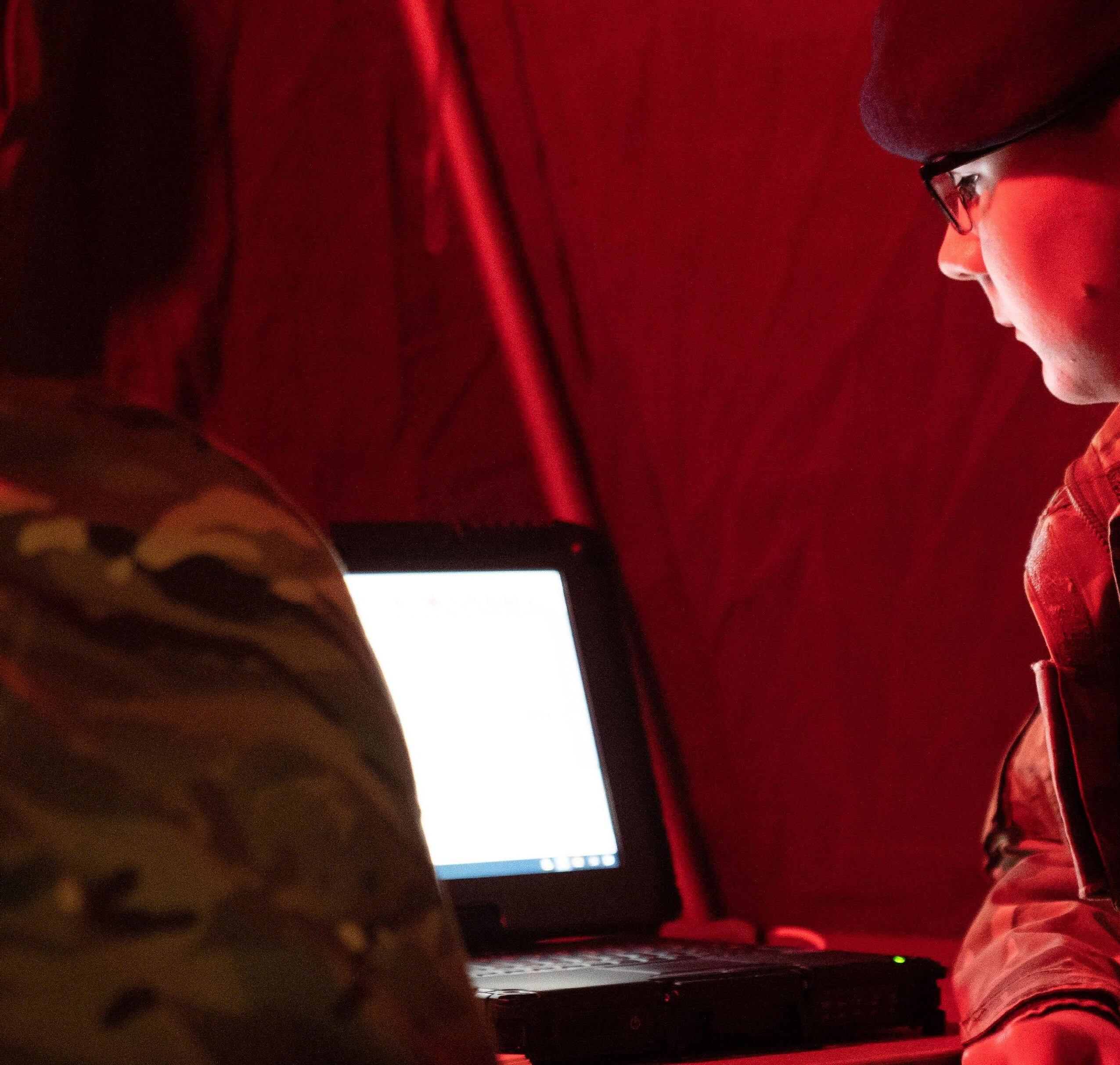
I joined the ACF in 2011 and became involved with the CIS Training Team when I went on a radio training course. It just so happened that the team was developing a cyber course at the time and I was able to join the discussions, which turned into planning for the launch of CyberFirst. Within a month, we were running the first CyberFirst course. I’ve been the CyberFirst Project Officer in the Cadet CIS Training Team at Blandford Camp for four years now.

I spent a lot of time hanging out with my mates, listening to heavy metal and playing my guitar! I didn’t want to go to university and had no specific career aspirations until an IT teacher at school asked me to help fix some computers in my lunch breaks. I realised I liked the technical challenge of understanding how they worked and I particularly enjoyed helping people by creating effective systems and secure networks for them to use.
As soon as I left school I was employed as the school’s IT technician. Following a degree course with The Open University, I moved into cyber security and am now the principal cyber-security engineer for a major global logistics company. I help ensure many of the components and products used in our everyday lives get to where they need to be, without disruption or delay. When you consider how many items are moving around the planet all day, every day, and all the related automated processes, it makes for an interesting job.

The Adventurers course introduces cadets to the breadth of cyber by raising their awareness of how data is used. It’s far more than an e-safety course. They’ll use open-source intelligence gathering to solve a problem and work in teams to crack codes. And they’ll explore data more creatively in topics such as website creation and data analysis in sport.
Words like ‘coding’ and ‘data’ can sound geeky but data is a huge and interconnected part of our lives, which is why cyber security is so important. Adventurers demystifies this and empowers cadets to get involved.
The Defenders course tightens the focus on cyber security and offers cadets the chance to get more hands-on with the tech, so they can learn how to protect themselves online.
They work in a team to build a network that mimics a home network, with a broadband router and a webcam, which is connected to another team to simulate the internet. The exercise enables them to safely witness what happens when your network is vulnerable and your camera can be accessed by someone outside your home network.
It’s all very well being told you need to be careful online, but when you see how something works and how it can be compromised, you become far more motivated to take control of your own cyber security. Defenders gives cadets the skills to do this.

The Advanced course takes things a step further and introduces digital forensics, which includes
'You become far more motivated to take control of your own cyber security'Capt Robb Bloomfield ACF at a Cyberfirst Defenders course at Blandford in 2018. Photo Robb Bloomfield. Crown Copyright Cadets taking part in EX Rolling Thunder 2019
carrying out investigations and trying to recover lost or apparently deleted data. It also covers exploring encryption technologies and looking at the broader career opportunities in and around cyber security.
Cadets who complete the Advanced course will have in-depth knowledge of cyber security, making them an asset to any workplace, whatever the role. If they’re considering a career in cyber security, completing the Advanced course will also help them stand out when applying for work experience, apprenticeships, university places or bursaries.



All cadets are welcome. The CyberFirst programme is free, and the tech is accessible during the courses so it doesn’t matter if cadets don’t have a computer at home. We make sure all cadets feel welcome and engaged, regardless of their skills, hobbies, background or confidence level.
Diversity within a cyber security team is key to its success. We all have different life experiences, interests, abilities and perspectives. These help teams to analyse threats – including how, why, when and where they may arise – and better understand the mindset and behaviour of the people we’re trying to protect.
Cyber security offers lots of opportunities as it’s a rapidly growing field that affects almost every aspect of our lives. Even if you don’t enjoy STEM subjects at school, don’t rule it out.
Global cyber security requires complex legislation and regulation, creating opportunities for lawyers. Farming is increasingly using GPS technology and automation, so there’s a demand in cyber
'They’ll use open-source intelligence gathering to solve a problem and work in teams to crack codes'
security for people with knowledge of agriculture. Expertise in psychology, sociology, politics or economics is also helpful in understanding threats and the motivation behind them.
When we don’t understand something it can seem intimidating, and this certainly applies to cyber security.
The knowledge cadets develop through the CyberFirst programme gives them confidence online and elsewhere in their lives. They feel empowered to share their knowledge of cyber security with friends and family, because they’ve learned that our cyber defence is only as strong as the weakest link. Any one of us could be that link, but attending a CyberFirst course means it’s less likely to be you, and sharing our knowledge makes us stronger collectively.
You might begin by strengthening a friend’s social media privacy settings or helping your nan spot a phishing scam, but you could end up knowledge-sharing as part of a cutting-edge, code-cracking team at Government Communication Headquarters (GCHQ). It all starts with CyberFirst!
Click here or scan the QR code to find out more about CyberFirst.

Cadets interested in taking part in the CyberFirst programme should firstly take a look at the courses available on the cadet portal and then speak to their detachment commander.
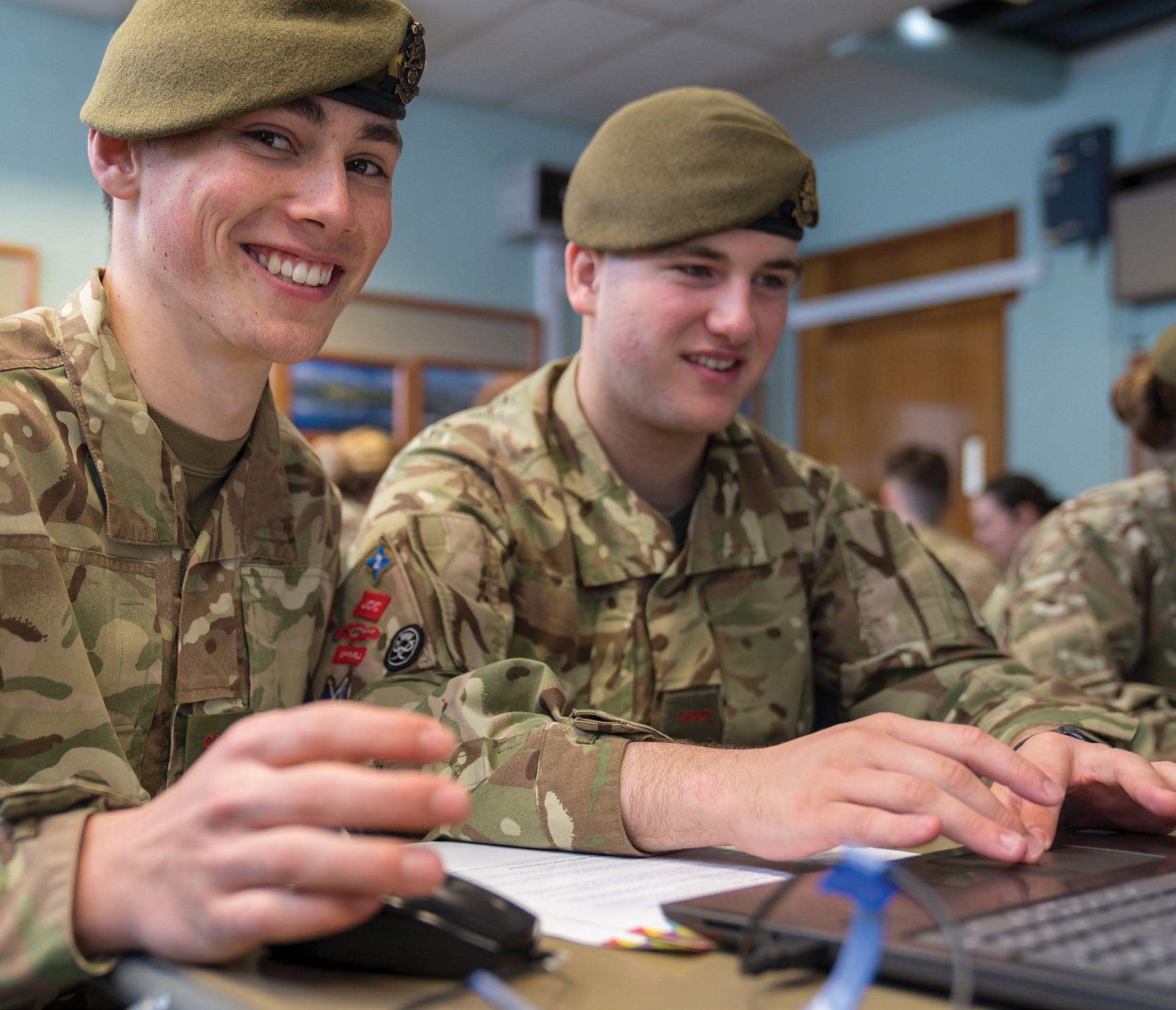
Keeping hydrated is one of the most important ways to maintain a healthy body. Terry Hayter, SO2 Sports and Physical Development at HQ Regional Command, expands on the advice in the Keeping Active Training Manual.
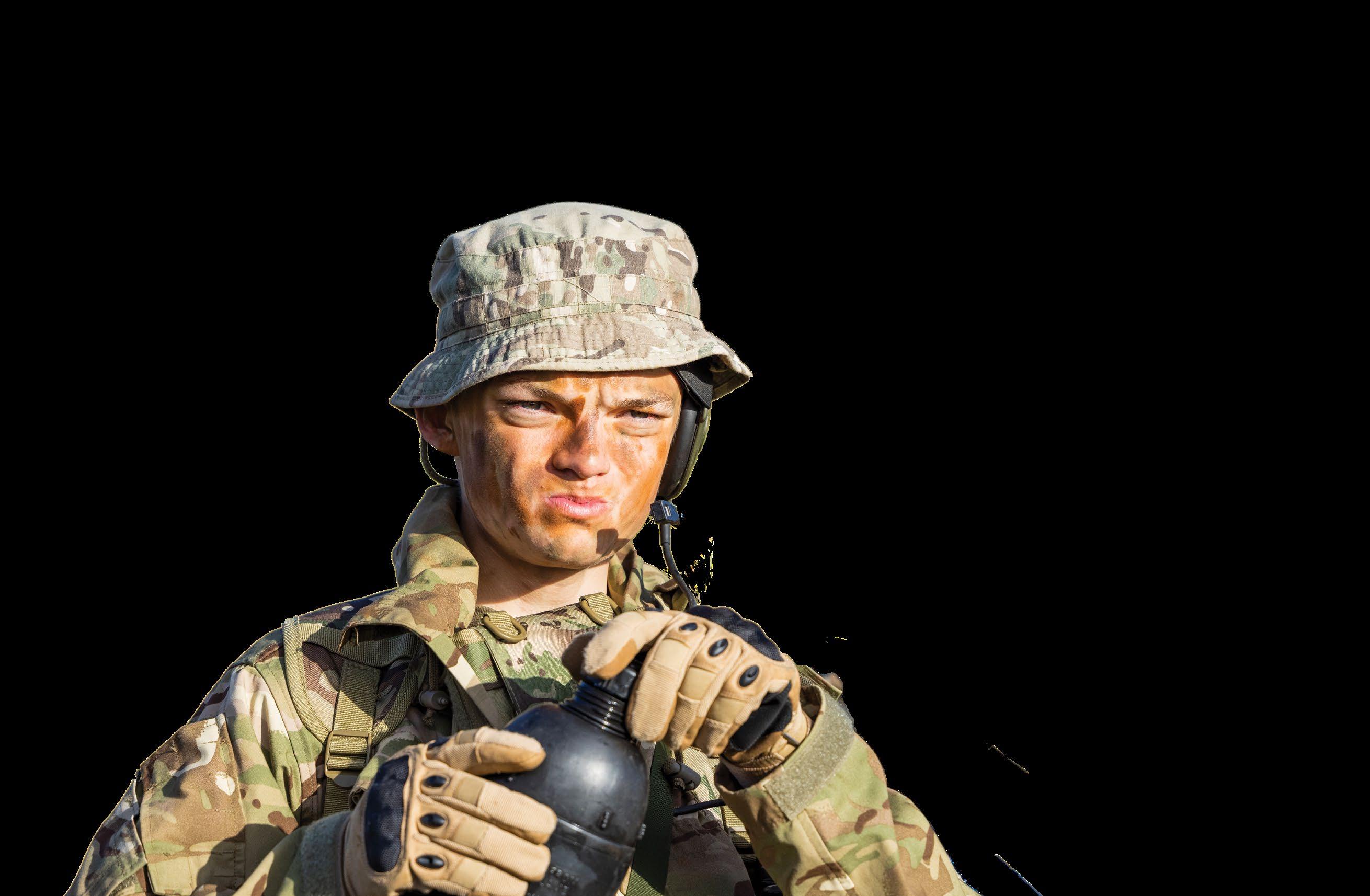

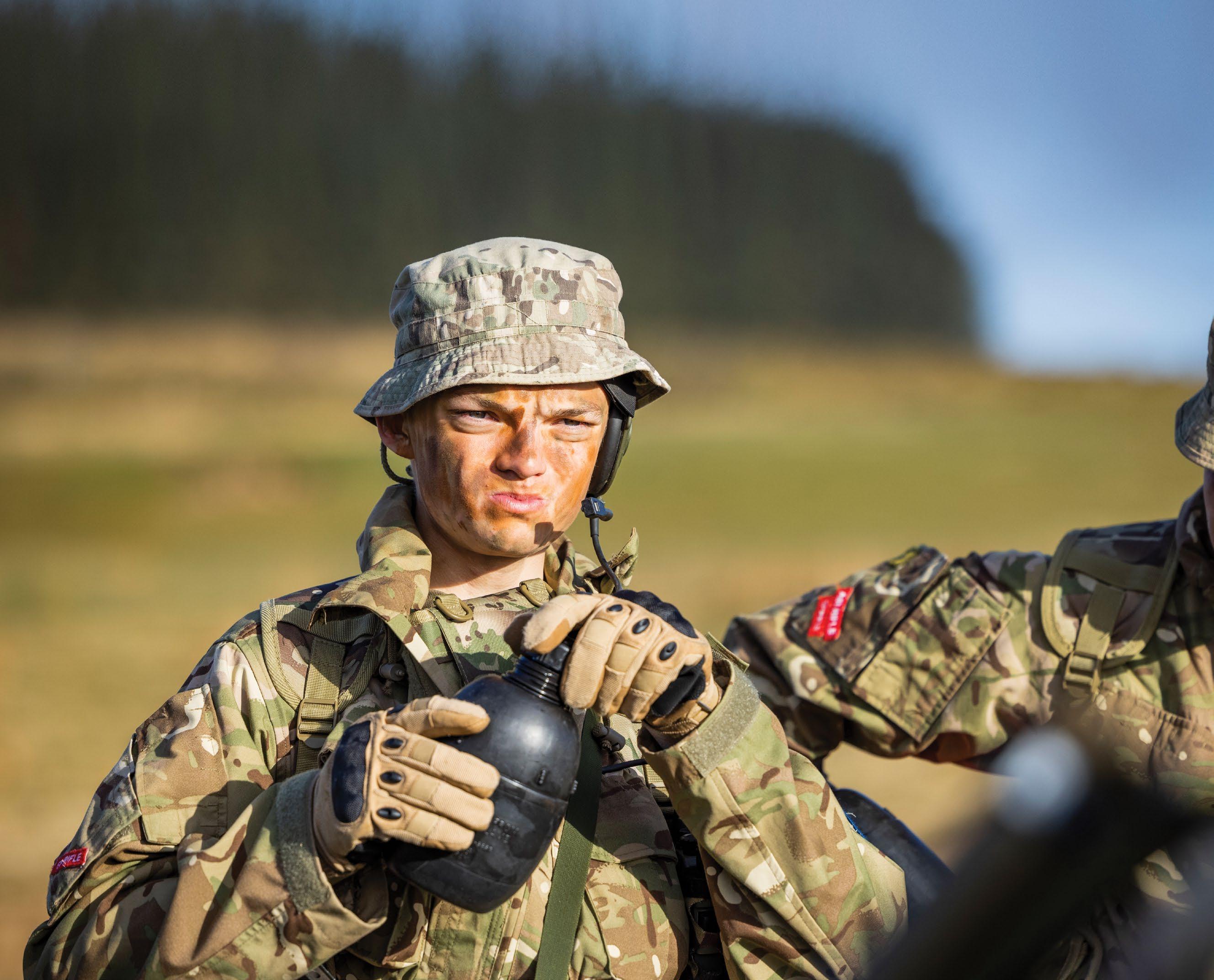
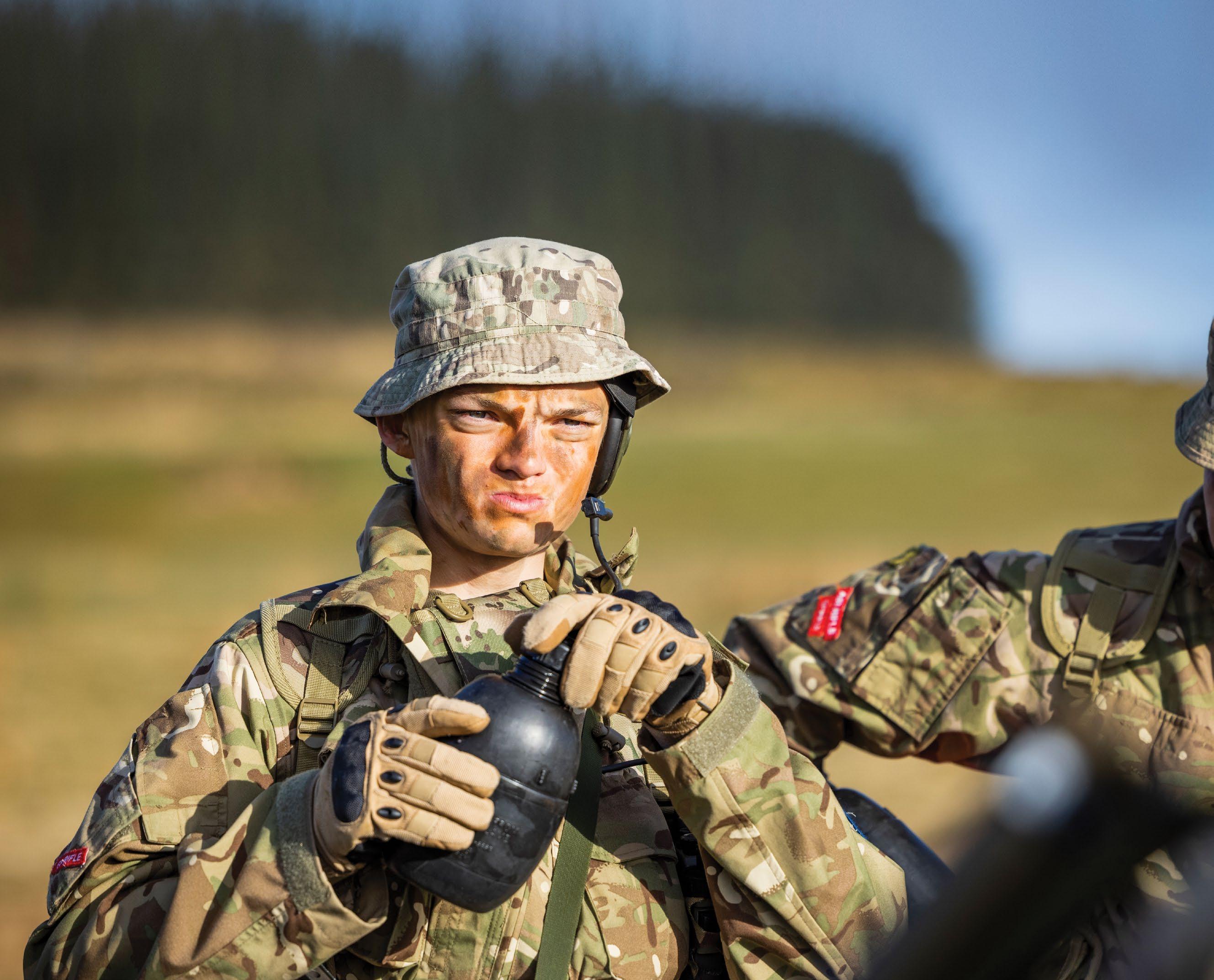
It may be surprising to learn that water makes up 60 per cent of the human body. Water is needed for a wide range of processes within the body, for example it's used by the kidneys to flush out waste and toxins via urine, helps the digestive system function properly, keeps joints lubricated, and is used by the circulatory system to help carry essential nutrients, oxygen and glucose to cells.
Water is also important for regulating the body's temperature and preventing dehydration. When it's hot, water is lost through sweat which helps to keep the body cool. This is why you should drink more when you're hot after exercising, or in a hot climate, as lost fluids need to be replaced.
The best way to stay hydrated is to drink around two litres of fluids each day (roughly eight glasses). While water is the best source of hydration because it has no calories or sugars, your daily fluid intake can also be obtained from other drinks such as milk and sugar-free drinks.
It’s worth noting that you don’t need to consume sports or electrolyte drinks to improve physical performance. Eating a balanced diet should provide and replace all the electrolytes and nutrition you need. You won't need to get more through drinks or supplements, which often contain added sugars.
While good hydration is essential, it’s worth bearing in mind that it is possible to overhydrate if you drink too much. Overhydration causes an imbalance in the body’s electrolytes. Signs of overhydration include nausea and vomiting, headaches, fatigue, confusion or disorientation, and muscle cramps.

One of the simplest ways to make sure you’re staying hydrated is to check the colour of your urine. Very pale yellow urine is a good sign and means you’re staying hydrated, but darker yellow/brown urine suggests you are dehydrated and need to drink more.
Water is so good for you, but if you find it too bland here are some ways to make it more exciting.
Adding fresh slices of strawberry, lemon, lime, orange or cucumber to your water bottle will enhance the flavour, as will fresh mint or ginger.

If you’re bored of still water, try sparkling instead. Opt for sparkling mineral water which has been carbonated at source and has nothing added to it. Or add some fizz yourself at home using a sparklingwater maker, such as a SodaStream.
If room-temperature tap water doesn’t appeal, adding ice can make it more thirst quenching. Get creative by freezing chunks of kiwi or melon or adding frozen berries to your drink for an additional fruity, icy hit.
The topic of hydration will feature in a new upcoming Army Cadets Healthy Eating video.
The film will be a useful resource if you want to find out more about the foods you should eat and the ones to avoid to maintain a balanced diet.
Army
releasing a Keeping Active video, which will cover moderate physical training including exercises you can do at home in your own time.
Keep
'The human body is made up of up to 60 per cent water'Cadets is also
your eyes peeled in future issues for details of where to see the videos.

Choose from a range of shorter 5 day adventures to full blown 19 day expeditions in the wildest corners of the UK.
Adventures available for 10–22-year-olds outwardbound.org.uk/summer
